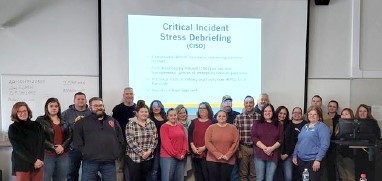
Critical Incidents, such as natural disasters, accidents or shootings, can have devastating impacts on the people involved as well as the helpers who assist them afterward. Helping people cope with critical incidents and psychological harm was the topic of a special training provided recently by NCCMH to two dozen first responders.
First responders, EMS, fire, law enforcement, and hospital emergency department staff joined NCCMH staff in intensive learning with Susan Elben, MSW, LMSW, an instructor for International Critical Incident Stress Foundation, Inc (ICISF), over three days at the Gaylord/Kirkland University Center.
The class, sometimes referred to as psychological first aid, was designed for people without formal training in mental health, as well as mental health professionals, who desire to increase their knowledge of individual and group crisis intervention techniques in order to be better prepared to help their communities.
Amy Christie, NCCMH Chief Clinical Officer explained why NCCMH sponsored the training, which they offered to community partners at no cost: “We planned this training to increase our community’s preparedness to deal with critical incidents. As we all responded to the Gaylord tornado last fall, when many people were traumatized, we needed ‘all hands-on deck’ to help. On-scene help was needed and peoples’ needs continued long after the event itself. Luckily, in our small communities, people rally together and do what they can. In the aftermath, we may need some psychological first aid too, to help deal with the trauma emotionally. Too, in small communities such as ours, the helpers themselves often also experience trauma because they may know or be related to the people involved. The three-day course prepared participants to understand a wide range of crisis intervention services, including pre- and post-incident crisis education, on-scene support, support for significant others, demobilizations after large scale traumatic incidents, and small group defusings,” Christie explained.
“The training offered positive opportunities for collaboration for future partnerships as well as increased knowledge of mental health issues and concerns within our communities,” Christie added.
Bill Drollinger said, “As Chief of Police for the Bellaire Police Department and Assistant Chief of the Bellaire District Fire Department, I had the opportunity to attend the Crisis Intervention Stress Debriefing Training. This training is designed to assist Front Line Emergency Service Personal to deal with traumatic events. Most Emergency Service Personnel are reluctant to talk about tragic events and research has shown that early debriefing can help with mental health concerns. Crisis Intervention Stress Debriefing is a very important step in Emergency Services to assist in the health and well-being of First Responders.”


